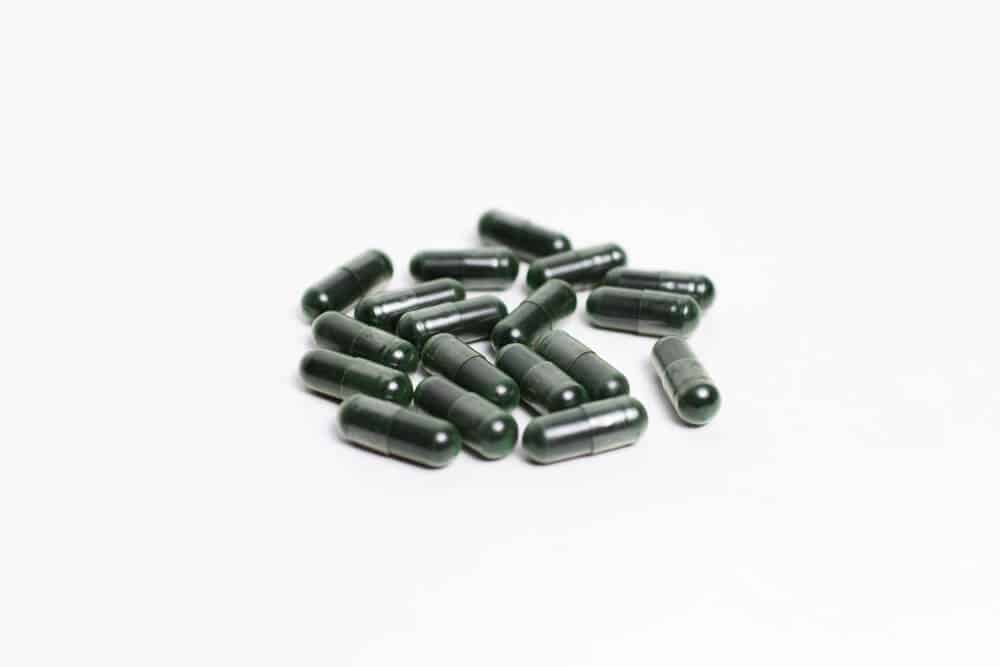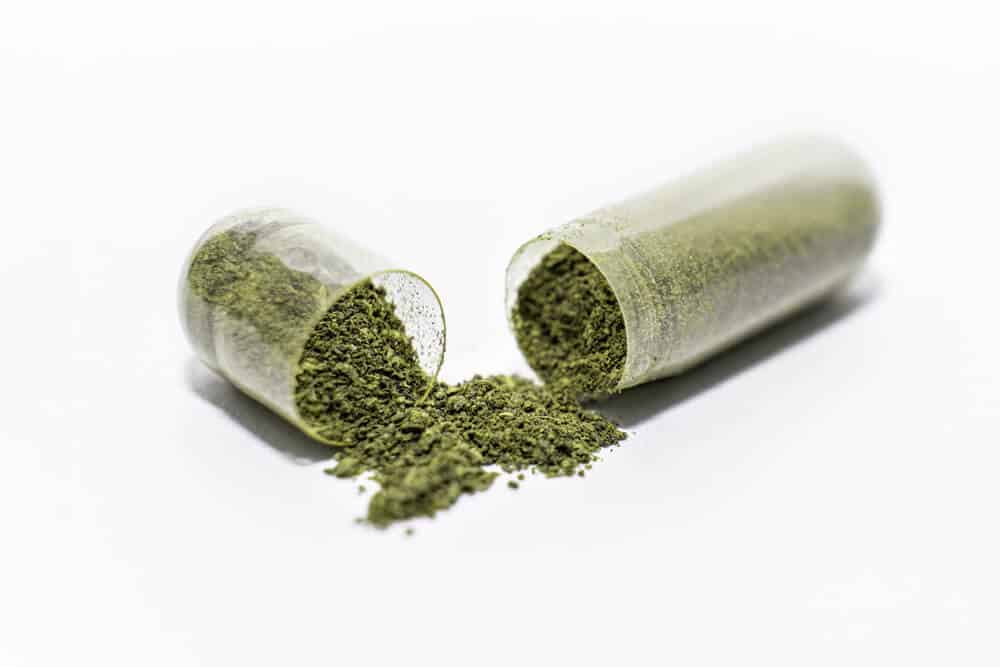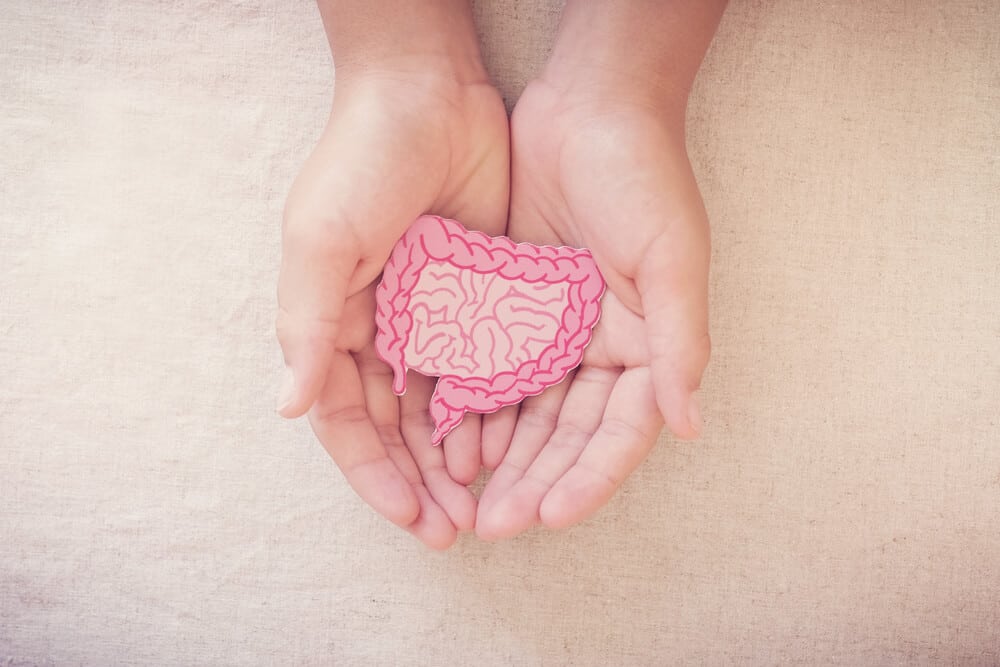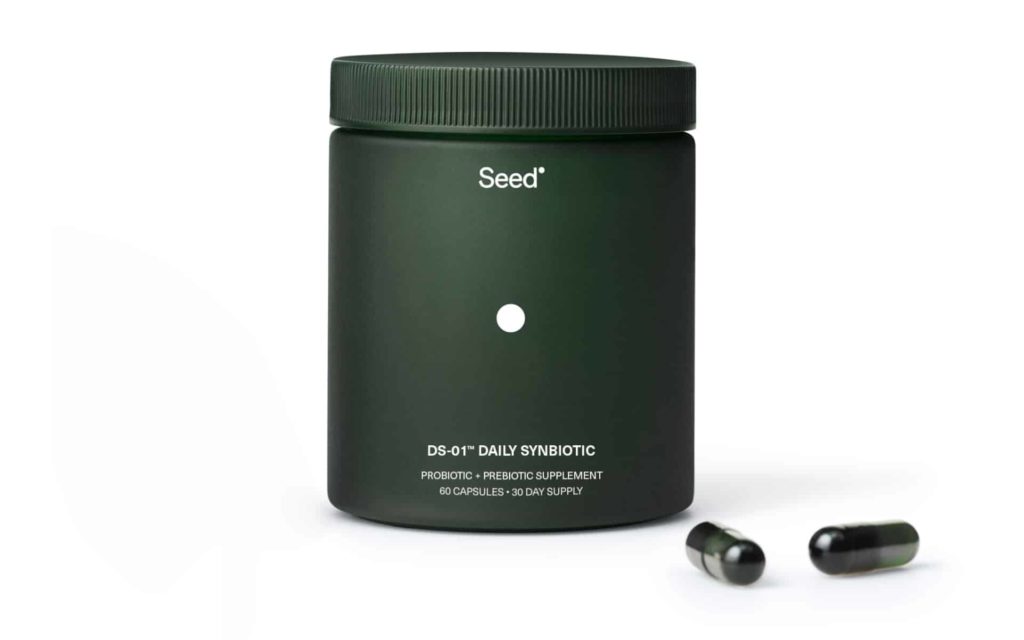Through special capsule technology and proprietary probiotic formula, Seed Probiotic claims their DS-01 Daily Synbiotic supplement can improve digestive, cardiovascular, and dermatological health. The product also claims it can reduce inflammation while supplying the body with the micronutrients it needs.
What ingredients can be found in Seed Probiotic? Are there any research studies backing up these claims? To find out more about this probiotic product, our team took a closer look at the formula research, ingredients, potential side effects, and so much more. If you are ready to learn more about the DS-01 Daily Synbiotic, make sure to keep reading to the bottom line!
Seed Probiotic can be purchased through their Official Site.
What is Seed Probiotic?

Seed Probiotic is a brand that sells one supplement, DS-01 Synbiotic. This supplement is a composite synbiotic that includes a 24-strain formulation. According to Seed, the formula is scientifically tested.
Seed Probiotic also claims that the Synbiotic product employs a precise release system, which helps the strains reach the lower small intestine. Once the synbiotic reaches its destination, it delivers benefits, including improvements to digestive, heart, skin, and gut health.
Overall, the product says it is a next-generation probiotic that goes beyond digestive issues and supports full-body health. The product also stands out for its delivery system, which uses two casings. The probiotic formula is enclosed within a prebiotic casing, made from Indian pomegranate, to ensure the bacteria survive both sitting on store shelves and the journey through the stomach acid to the colon.
Before diving deeper into Seed Probiotic, let’s see what the research has to say about a few of its ingredients:
- Nutrients: This study found that Bifidobacterium breve could have antimicrobial activity while supporting the immune system.
- International Journal of Food Sciences and Nutrition: According to this study, Bifidobacterium longum had protective effects on the skin in animals.
- Microorganisms: This study found that Lactiplantibacillus plantarum had multiple health benefits and contained anti-inflammatory, antioxidative, and antimicrobial activity.
Seed Probiotic Competitors
| Product |
Review
|
|
|---|---|---|
| Plexus ProBio5 | read | |
| Noom | read |
Who Makes The Seed Probiotic?
Seed Probiotic, also called Seed Health, makes the DS-01 Synbiotic supplement. The co-founders of Seed Probiotic are Ara Katz and Raja Dhir.
The company does not sell any other products, but they do have a laboratory called Seed Labs, where scientists research the benefits of probiotics in other areas of the world, like honey bees and coral.
According to the official website, the Seed Probiotic has a long list of specialists on its Scientific Advisory Board. Additionally, the company has surrounded itself with scientists, researchers, doctors, and authors.
Seed Probiotic Customer Service
Individuals can the company at 844-646-3586 or email them at [email protected]. Furthermore, customers can reach out to them on social media.
Seed Probiotic and the Better Business Bureau (BBB)
The BBB page for Seed Health shows a rating of A-. There have been no customer reviews, but four complaints have been closed in the past three years and three in the last 12 months.
Scroll below for one of the best products we’ve seen over the last year.
Seed Probiotic Claims
Seed Health claims it has taken a new approach to probiotics to create a more efficient product DS-01. The company paired the probiotic with a prebiotic, which they say created a much more efficient product than other supplement pills.
According to Seed, prebiotics is designed to keep helpful microbes alive. When prebiotics and probiotics are combined, they tend to enhance the other’s effect.
The DS-01 probiotic claims to provide whole-body health through its premium blend of prebiotics and probiotics.
Seed Probiotic Ingredients

The ingredients in DS-01 from Seed Probiotic are found in multiple blends:
Digestive Health, Gut Immunity, and Gut Barrier Integrity Blend
The ingredients found in this blend include:
- Bifidobacterium longum
- Bifidobacterium infantis
- Bifidobacterium breve
- Bifidobacterium lactis
- Limosilactobacillus reuteri
- Limosilactobacillus fermentum
- Lactobacillus crispatus
- Lacticaseibacillus rhamnosus
- Lactiplantibacillus plantarum
- Lacticaseibacillus casei
Dermatological Health Blend
This dermatological blend contains:
- Bifidobacterium lactis
- Bifidobacterium longum
- Ligilactobacillus salivarius
- Lacticaseibacillus casei
Cardiovascular Health Blend
This heart blend contains:
- Bifidobacterium lactis
- Lactiplantibacillus plantarum
Micronutrient Synthesis Probiotic Blend
The ingredients in this blend include:
- Limosilactobacillus reuteri
- Bifidobacterium adolescentis
Microbiota-Accessible Polyphenolic Precursors
This contains Indian Pomegranate (whole fruit)
Other Ingredients
The other ingredients include:
- Chlorophyllin (outer capsule composition)
- Hypromellose, fermented gellan gum, water (inner capsule composition)
- Organic rice fiber and organic rice extract blend
Does Seed Probiotic Work?

Currently, Seed Probiotic is working on clinical trials for its probiotic supplement.
According to ClinicalTrials.gov, Seed Health is testing its DS-01 supplement to see if it can help rebuild gut microbiota after antimicrobial therapies. Another study posted through ClinicalTrials.gov is testing the effects of the DS-01 synbiotic supplement from Seed Health for its effects on irritable bowel syndrome (IBS).
Seed Health is also currently sponsoring a study testing a children’s synbiotic supplement called PDS-08, according to ClinicalTrials.gov.
There have been some studies on the effectiveness of synbiotics and multi-strain probiotics as well.
According to Nutrients, multi-strain probiotics may be useful for reducing diarrhea in individuals with IBS. Another study in Nutrients found that synbiotics may be able to boost immune health and restore gut microbiota health.
Seed Probiotic and Weight Loss
There is some research supporting the connection between the gut microbiome and body weight. One study published in the Journal of Agricultural and Food Chemistry was conducted on the effect of grape seed flour, a prebiotic, and lactic acid bacteria, a probiotic. The study shows that the combination of the two affected weight gain.
More research published in the Journal of Translational Medicine found that muti-strain probiotics could lead to improved insulin resistance and slightly reduced abdominal adiposity, though no significant changes in weight or BMI were seen.
Seed Probiotic Side Effects
Seed suggests that there may be some moderate side effects when using their products, which include upset stomach issues, gas or other intestinal difficulties, and increased burping.
How to Use Seed Probiotic
Users should take 1 capsule each day, for the first three days. After that, start taking 2 pills a day. The pills must be taken simultaneously. It’s ideal to take the pills on an empty stomach, but in case of any discomfort, it’s possible to take them immediately after a meal.
The capsules must be stored in a cool, dry place and are good for up to 18 months.
Cost and Where to Buy

As of right now, the subscription to Seed probiotic is $49.99 a month. It can be bought on Seed’s website.
Pros and Cons
Pros
- Seed Probiotic is working on getting published through clinical trials.
- Multiple studies support the claim that multi-strain probiotics are beneficial to gastrointestinal health.
- Many of the reviews for the supplement are positive.
Cons
- Some customers have complained of side effects while using the supplement.
Bottom Line on Seed Probiotic Results
When our team started researching Seed Probiotic, they were surprised. Seed Health is currently working on multiple clinical studies to prove it can help improve gut health in a number of ways. Additionally, there are plenty of studies backing up the ingredient’s ability to improve digestive health, boost immunity, and even reduce inflammation. However, some users experienced some negative side effects when using DS-01, which is something to keep in mind.
Improving your health requires a lot of different practices, and adding in a healthy probiotic is just the start. That’s why so many people are turning to Noom to help guide them toward a healthier lifestyle.
Color-coded food logging, community support, 1:1 coaching sessions, custom meal plans, and personalized educational lessons are just a few of the tools available from Noom. These tools help guide users toward healthier practices that lead to improved wellness and weight loss. Plus, the system is backed by multiple clinical studies and tons of customer testimonials, which is a huge bonus. If you are ready to try this program today, make sure to check out their free trial offer, available for a limited time!
| Seed Probiotic Customers Also Bought: |
Effective
|
Testimonials
|
Free Trial Offer
|
|||
|---|---|---|---|---|---|---|
| Explanation of Chart | ||||||
|
Noom (4.6)SPONSORED |
||||||
|
Garcinia Cambogia (3.9) |
||||||
|
Caralluma Fimbriata (3.4) |
||||||
|
Forskolin (3.1) |
||||||
|
CLA (2.9) |
||||||
Seed Probiotic Questions & Answers
Seed Probiotic is a daily supplement that contains a blend of prebiotics and probiotics to support digestive and immune health.
Prebiotics are non-digestible fibers that stimulate the growth of beneficial bacteria in the gut.
Probiotics are live bacteria that, when consumed in adequate amounts, provide health benefits to the host.
Seed Probiotic contains 24 clinically-studied strains of bacteria, including Bifidobacterium longum, Lactobacillus plantarum, and Streptococcus thermophilus.
Seed Probiotic contains 53.6 billion CFUs per dose.
Seed Probiotic can be purchased using their Official Site.
Yes, Seed Probiotic is vegan and does not contain any animal products.
Yes, Seed Probiotic is gluten-free and does not contain any wheat, barley, or rye.
Yes, Seed Probiotic can be taken with antibiotics to help maintain healthy gut flora.
Seed Probiotic does not need to be refrigerated, but it should be stored in a cool, dry place away from sunlight.
Results from Seed Probiotic may vary, but some users have reported improvements in digestion and immune function within a few days to a few weeks of starting the supplement.
Seed Probiotic is not recommended for children under the age of 18 without consulting a healthcare professional.
Seed Probiotic is a dietary supplement and is not subject to FDA approval. However, the product is manufactured in a facility that is FDA registered and follows Good Manufacturing Practices (GMP).
Seed Probiotic is a high-quality probiotic supplement designed to support digestive health and a healthy gut microbiome. It contains 10 clinically researched strains of live, active cultures and is third-party tested for purity, potency, and safety. It also includes prebiotics to help nourish the probiotics, helping them survive in the body so they can reach the gut alive. Seed Probiotic is suitable for vegetarians and vegans and can be taken daily to support digestive balance and immune system health.
Article Sources
- https://seed.com/daily-synbiotic
- https://noom.8utb.net/c/1720052/500038/8591
- https://noom.8utb.net/c/1720052/500038/8591
- https://noom.8utb.net/c/1720052/500038/8591
- https://www.ncbi.nlm.nih.gov/pmc/articles/PMC6265827/
- https://pubmed.ncbi.nlm.nih.gov/26470918/
- https://www.ncbi.nlm.nih.gov/pmc/articles/PMC7916596/
- https://noom.8utb.net/c/1720052/500038/8591
- https://noom.8utb.net/c/1720052/500038/8591
- https://clinicaltrials.gov/ct2/show/NCT04171466?term=DS-01&draw=2&rank=2
- https://clinicaltrials.gov/ct2/show/NCT04598295
- https://clinicaltrials.gov/ct2/show/NCT04534036
- https://www.ncbi.nlm.nih.gov/pmc/articles/PMC7996889/
- https://www.ncbi.nlm.nih.gov/pmc/articles/PMC5622781/
- https://pubmed.ncbi.nlm.nih.gov/30392364/
- https://www.ncbi.nlm.nih.gov/pmc/articles/PMC5725828/
- https://noom.8utb.net/c/1720052/500038/8591
- https://noom.8utb.net/c/1720052/500038/8591
Partner with Us!
Looking to promote your weight-loss products or services?
Our platform reaches a dedicated audience actively seeking the best solutions. Contact us to explore advertising opportunities and grow your brand with us.
Get in Touch
